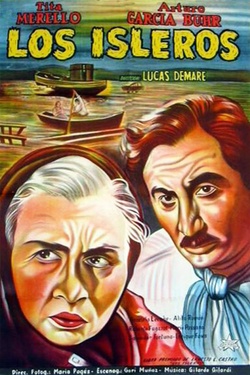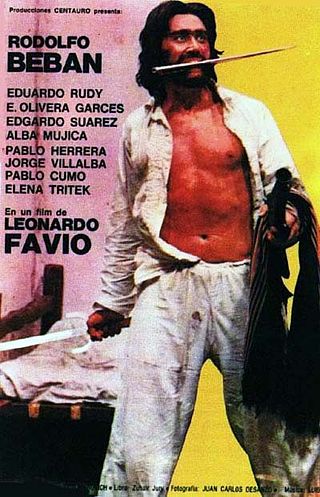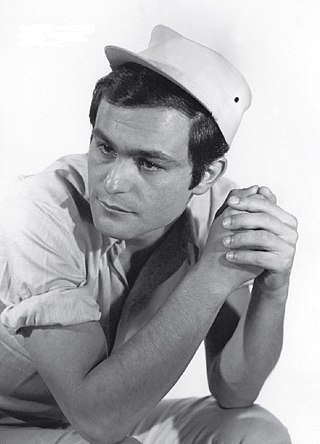
Such Is Life is a 1939 Argentine melodrama film directed by Francisco Múgica and starring Enrique Muiño, Elías Alippi, Enrique Serrano and Sabina Olmos. It is one of the most celebrated films of the Golden Age of Argentine cinema. Based on a successful play of the same title by Nicolás de las Llanderas and Arnaldo Malfatti, it focuses on the history of a bourgeois family from Buenos Aires from the beginning of the 20th century to the present. A Mexican remake Orange Blossom for Your Wedding was released in 1950.
North Wind is a 1937 Argentine film of the Golden Age of Argentine cinema directed by Mario Soffici.

The Phantom Lady is a 1945 Argentine film directed by Luis Saslavsky during the classical era of Argentina cinema. At the 1946 Argentine Film Critics Association Awards the film won Silver Condor Awards for Best Film, Best Director, Best Adapted Screenplay and Best Music. It is based on a seventeenth-century comedy with the same name by Pedro Calderón de la Barca, translated as The Phantom Lady. However, the film alters the play considerably - the plot is heavily rewritten, and the style of dialogue is completely changed. Calderon's comedy is written in verse, while the screenplay of the film is in prose and contains scenes not found in the play. The final scene includes a fierce storm from which the hero rescues the heroine and declares his love for her, a scene added to the film.

Los isleros is a 1951 Argentine film directed by Lucas Demare, during the classical era of Argentine cinema. It was entered into the 1951 Cannes Film Festival. It won the Silver Condor Award for Best Film.

The House of the Angel is a 1957 Argentine drama film directed by Leopoldo Torre Nilsson based the novel of the same name by his wife Beatriz Guido, who also co-wrote the screenplay.
La caída is a 1959 Argentine drama film directed by Leopoldo Torre Nilsson. It won the Silver Condor Award for Best Film was entered into the 9th Berlin International Film Festival.

Este es el romance del Aniceto y la Francisca, de cómo quedó trunco, comenzó la tristeza y unas pocas cosas más…, or simply El Romance del Aniceto y la Francisca, is a 1967 Argentine romantic drama film directed and written by Leonardo Favio, based on the short story El cenizo by Jorge Zuhair Jury, Favio's older brother. The film stars Federico Luppi, Elsa Daniel, María Vaner and Edgardo Suárez.
Heartbreak Tango is a 1974 Argentine drama film, directed by Leopoldo Torre Nilsson.

Gatica, el mono is a 1993 Argentine drama film directed by Leonardo Favio. It is a biopic of Argentine boxer José María Gatica.
Shunko is a 1960 Argentine drama film directed by and starring Lautaro Murúa. It was written by Augusto Roa Bastos and based on Jorge W. Abalos' novel of the same name. It won the Silver Condor Award for Best Film. In a survey of the 100 greatest films of Argentine cinema carried out by the Museo del Cine Pablo Ducrós Hicken in 2000, the film reached the 16th position.

Juan Moreira is a 1973 Argentine dramatic historical film directed by Leonardo Favio and starring Rodolfo Bebán. It is based on the homonymous novel by Eduardo Gutiérrez, which narrates the life of the famous Argentine outlaw, gaucho and folk hero Juan Moreira.

Pajarito Gómez is a 1965 Argentine comedy film directed by Rodolfo Kuhn. It was entered into the 15th Berlin International Film Festival. It was also selected as the Argentine entry for the Best Foreign Language Film at the 38th Academy Awards, but was not accepted as a nominee. The film is a satire of the promotional machine behind the Argentine pop stars of the 1960s.
La muerte camina en la lluvia is a 1948 Argentine suspense film directed by Carlos Hugo Christensen and based upon the novel L'assassin habite au 21 written by Stanislas-André Steeman. It was premiered on September 7, 1948, during the classical era of Argentina cinema.
Last Days of the Victim is a 1982 Argentine crime thriller film directed by Adolfo Aristarain and starring Federico Luppi. It was written by Aristarain and José Pablo Feinmann, and based on Feinmann's classic novel of the same name. The film was selected as the Argentine entry for the Best Foreign Language Film at the 55th Academy Awards, but was not accepted as a nominee.

Malambo is a 1942 Argentine drama film directed by Alberto de Zavalía, written by Hugo Mac Dougall and starring Delia Garcés and Oscar Valicelli.

Safo, historia de una pasión is a 1943 Argentine erotic melodrama film directed by Carlos Hugo Christensen and starring Mecha Ortiz and Roberto Escalada, one of the most famous titles from the Golden Age of Argentine cinema. The film is based on the 1884 Alphonse Daudet novel Sappho. At the 1944 Argentine Film Critics Association Awards, Ortiz won the Silver Condor Award for Best Actress for her performance as Selva in the film.
Savage Pampas is a 1945 Argentine historical film directed by Lucas Demare and Hugo Fregonese and starring Francisco Petrone, Luisa Vehil and Domingo Sapelli. It is one of the most notable works of the classical era of Argentina cinema. The film's sets were designed by Germán Gelpi. The film is set in the nineteenth century in the semi-arid Dry Pampas region, when it represented a frontier between Argentine-controlled territory and areas still largely inhabited by Indians before the Conquest of the Desert extended Argentine control southwards. In 1966, Fregonese remade the film in English under the same title.

The Naked Angel is a 1946 Argentine drama film directed by Carlos Hugo Christensen and starring Olga Zubarry, Guillermo Battaglia and Carlos Cores. The film is based on the novella Fräulein Else by Arthur Schnitzler. The director, Christensen, had gained a reputation for exploring more sexual themes in his films than was traditional in Argentine cinema at the time. It is an iconic work of the classical era of Argentina cinema.

La fuga is a 1937 Argentine drama film directed by Luis Saslavsky and starring Santiago Arrieta.

The 100 Greatest Films of Argentine Cinema, also known as the Survey of Argentine cinema, are a series of opinion polls carried out to establish a list of the greatest films of Argentine cinema of all time. The original survey was carried out by the Museo del Cine Pablo Ducrós Hicken in the years 1977, 1984, 1991 and 2000. In 2022, a new edition was held, organized by the film magazines La vida útil, Taipei and La tierra quema, with support from INCAA, the Mar del Plata International Film Festival, the FestiFreak International Film Festival of La Plata, the Casa de la Cultura of General Roca and the Museo del Cine Pablo Ducrós Hicken.













